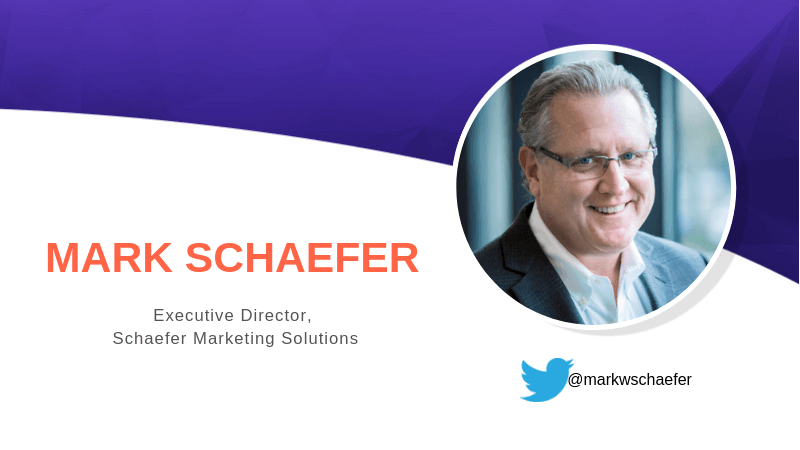Marketing Expert Mark Schaefer on Why Customers Are In Charge Today
Adam Dorfman


Mark Schaefer is a blogger, consultant and executive director of Schaefer Marketing Solutions. He is a best-selling author of books on Twitter, social media, influence and content. His newest book, Marketing Rebellion, posits that marketing is changing and the customers are in charge.
He spoke with us recently about how companies need to be authentic, relevant and local to succeed.
This interview has been edited and condensed.
Let’s start with your new book, Marketing Rebellion. Can you provide some insights on what “the most human company” looks like?
First, let’s step back and examine why this is a priority at all. One of the most significant problems in marketing today is that we have been over-automated. Technology has become the enemy of great marketing — and it’s not because tech is bad; it’s because it is good, easy and inexpensive. So we tend to overuse to the point that people hate us – our spam, our robocalls and the piles of direct mail littering their mailboxes.
In fact, it’s the opposite of what people want and need. So how do we break this cycle? We need to stop doing what people hate and meet customers on their own terms, with an authentic human voice.
What are some of the things that brands must do to respond to consumers?
The big lesson from my book is that the customers are in charge. Two-thirds of our marketing is occurring without us, through conversations, social media, reviews and influencers. The internet has shifted the power to the consumer. A brand used to be what we told our consumers it is; today, a brand is what consumers tell each other.
The trick for marketers now is to somehow have an impact on that two-thirds that is moving the needle. But we can’t buy our way in; we have to be invited, and that will require a mindset shift. My book explores the new options before us.
Can you talk about the distinction between human impressions versus advertising impressions?
Research shows that consumers believe companies that convey an image of warmth and competence. Over the years, we’ve tried to achieve that image through spending on advertising impressions. That’s how we’ve built our companies and our brands.
But those days are over. When we stream our news, music and television programs through subscription services like Netflix and Spotify, there are no ads. One-third of Americans have an ad-blocker on their phones. And even if they see an ad, they probably don’t believe it.
So we have to think differently. People may not trust our companies or ads, but they trust each other. Increasingly, the person is the brand, and the employees are the brand. How do we elevate those human impressions when advertising fails us?
What is consensual marketing?
Consumers are resigned to the dirty tricks companies play to try to get them to click on a link or an ad. There is very little fair value exchange in marketing today. We must strive to make the relationship consensual — which means we create something so fascinating, relevant and compelling that consumers gladly play along.
Some companies are even embarking on co-created customer journeys. Today any idea that we are controlling a sales funnel or customer journey is an illusion. The customers are in control.
When brands come to you for help, what are some of the things they need? What are their challenges?
I work primarily with marketing strategy and helping companies figure out how to move forward in this fast-changing world. It’s hard to stay relevant when technology and trends are changing so fast. So, I help unravel that.
How are disruptive technologies like IoT, automation, Big Data and cloud computing changing the way companies approach digital marketing? How do companies sort through and use the massive amounts of information available to them?
There is definitely a place for advanced technology in marketing. But where we run into problems is when marketing becomes a glorified IT department. Many studies show that marketing leaders don’t even understand the technology they already have, let alone the dramatic changes ahead. Given this, I fear the misuse of tech in marketing is going to get worse before it gets better.
The goal should be using technology to serve customer needs. If we can keep that in focus, we should be OK. Technology should be invisible and help our customers to be more responsive, attentive and fascinating.
You tweeted recently “Marketing today must be artisanal. It must be real, local, personal (not just personalized) and approachable.” It’s a wonderful perspective. In your mind, what should brands do to be real, local and personal?
That is a big question and not an easy one to answer. The reason many legacy brands are failing is that they have no emotional relevance on a local level. People only believe what they experience, what they see happening in their families and their communities.
I think any company that touts their environmental progress or a stand on diversity today appears kind of silly. What they are really saying is, “We’ve stopped being bad. Look at us! We’re normal now!” It’s hardly a point of differentiation, and people probably don’t believe it anyway. Companies do this to raise a stock price.
To connect to customers today, you can’t just be in a city; you also have to be part of that city and show up in people’s lives tangibly and positively. That’s why local and artisanal companies of every kind are walloping the big brands.
What are the next big things in social media marketing? Where do you see it headed in the next couple of years?
Social media has been stuck in a very long period of discontent and controversy. It has become a cesspool really.
There is a real opportunity for companies to break out and join these human conversations in a way that leads to an emotional connection. Of course, there is an essential functional aspect of social media — answering questions and complaints, for example.
But there is also a tremendous opportunity to use social media to help people connect, belong, believe and find meaning in their lives.
Winning in this environment is going to take more work. We’ll have to be more human in everything we do. The most human company wins.

